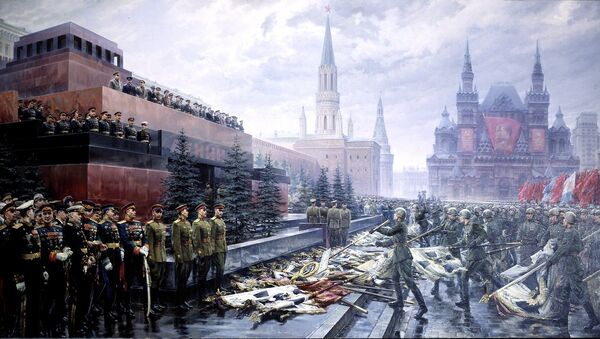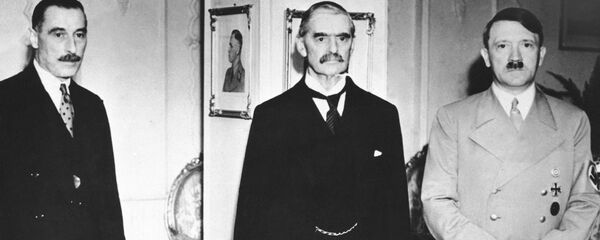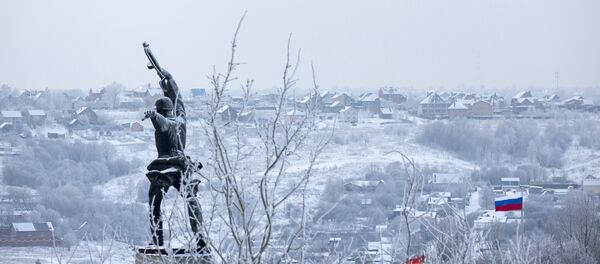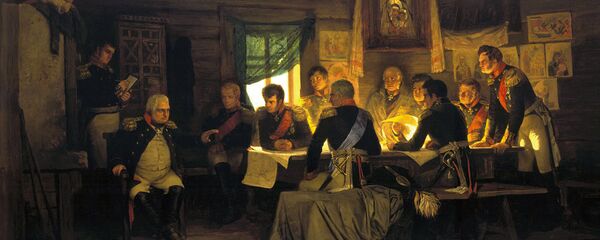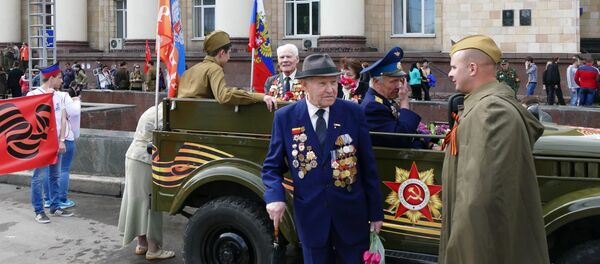Russian online newspaper Vzglyad offers a Top 5 of the most common myths surrounding the titanic 20th century struggle.
Myth #1: 'The Soviet Alliance With Nazi Germany'
One of the most common myths, actively used by the Polish government in its squabbles with Russia over the memory of World War II, asserts that the Soviet Union cooperated, collaborated with or was even allied to Nazi Germany during the first stages of the Second World War. To break this myth, Vzglyad notes, it's necessary to recall events from earlier in the century.
"In 1919, Poland, looking grab the territories of the former Russian Empire amid the chaos of the Russian Civil War, decided, with the support of the Entente, to intervene against Soviet Russia, Soviet Byelorrusia and Soviet Ukraine. As a result of the Soviet-Polish War, western Ukraine and western Belarus came under Warsaw's control."
Two decades later, "in September 1938, the great powers of Britain and France, pursuing a policy of appeasement vis-à-vis Hitler, ordered Czechoslovakia to cede control of the Sudetenland to Germany. The agreement was signed in Munich on September 30 and went down in history as the 'Munich Conspiracy'," (also known as the Munich Betrayal in Czech historiography). "The Sudetenland turned out not to be enough for Hitler, and he eventually took all of Czechoslovakia, apart from the Cieszyn region. The area was taken by Poland, which presented its own ultimatum to Prague. The great powers did not respond to the partition."
"On September 1, 1939, the Wehrmacht invaded Poland. On September 3, Britain and France declared war on Germany, but this was a 'phony war'," (with fighting on the western front effectively limited to a few skirmishes until Germany's invasion of France, the Netherlands and Belgium in the spring of 1940). "On September 4, 1939, France and Poland signed an agreement of mutual assistance, out of which nothing more would come."
"The Poles' requests for military support would go unanswered, and on September 9, the Polish government began negotiations for asylum in neighboring countries; on September 13, the country's gold reserves were evacuated, and the leadership fled to Romania on September 17. The same day, having ascertained that the Polish state had virtually ceased to exist, the Soviet Union began moving troops into the territory of western Ukraine and western Belarus."
Admittedly, Vzglyad notes, "before that the USSR signed a non-aggression pact, known as the Molotov-Ribbentrop Pact, with Germany. But Poland itself had signed a similar agreement with Berlin, known as the Hitler-Pilsudski Pact, in 1934."
Myth #2: 'Ample Intelligence Warnings'
Another widely held myth, the newspaper recalls, is that "Stalin knew about Nazi Germany's impending attack, having been been repeatedly warned about it by Soviet intelligence, which even provided him with the date of the attack. But the leader did not trust anyone and did nothing," with disastrous consequences.
"We can thank the birth of this myth to Nikita Khrushchev and his report to the 20th Congress of the Communist Party of the Soviet Union [in 1956]. It's interesting to recall the arguments made by Khrushchev himself to substantiate his accusations. For instance, he noted that Stalin had been repeatedly warned about German preparations for war against the Soviet Union by Winston Churchill."
"It's interesting," Vzglyad notes: "Perhaps Stalin thought the same thing? In this regard Khrushchev's accusation is rather inconsistent."
In the same speech, Khrushchev recalled that in "a report sent from Berlin dated May 6, 1941, the Soviet naval attaché reported that 'Soviet citizen Bothner told the assistant of our naval attaché that, according to a German officer from Hitler's headquarters, the Germans were preparing for an invasion of the USSR on May 14 through Finland, and the Baltics. Simultaneously, powerful air raids were planned to be conducted against Moscow and Leningrad, as well as landings by airborne troops.'"
"Once again," the newspaper notes, "it's unclear how Stalin should have responded to such a serious report, all the more so because as we know, the real war did not begin on May 14 [but on June 22], and progressed in a completely different manner."
Having said that, Soviet intelligence did make ominous reports, and Soviet spy Richard Sorge even called the date of the invasion. For decades, Russian and foreign historians have made much of Stalin's comments ridiculing Sorge and his warnings about the imminent attack.
However, Vzglyad notes, "with all due respect to the heroism of our intelligence forces, it should be noted that, if the reports of agents were to be arranged in chronological order, the following picture would emerge: In March 1941, agents 'Starshina' and 'Korsikanets' reported that the attack would begin around May 1. A report from April 2 suggested that the war would begin on April 15. And a report from April 30 said it would start 'any day now'. A report from May 9 predicted 'May 20 or June'. Finally, a report from June 16 said: 'the blow can be expected at any time'."
"In total, between March and June 1941, Sorge [alone] listed at least seven different dates for the beginning of the war; in March he reported that Hitler would first attack Britain, and in May said that 'this year, the danger can be avoided'. On June 20 his fateful report warning that 'war is inevitable' arrived."
"Generally," the newspaper notes, "even without these reports, it was obvious to the Soviet leadership that war was coming. The Red Army was undergoing rearmament. Under the guise of large training exercises, the covert mobilization of reservists was taking place. But intelligence could not offer a definitive answer on the date that the confrontation would start. The decision to mobilize would not only mean the withdrawal of workers, tractors and vehicles from the economy; it would mean the immediate commencement of war, since mobilization cannot simply start for no reason. The Soviet leadership in this situation believed that better later than sooner, the rearmament of the Red Army would be complete in 1942."
Myth #3: 'Stalin Bled the Red Army White'
One of the most common explanations for the catastrophic collapse that took place between summer and winter of 1941 is the repression against the Red Army on the eve of the war. "Again," Vzglyad recalls, "we are dealing with a thesis originally put forward in Khrushchev's report at the 20th Congress."
"Very grievous consequences, especially with regard to the beginning of the war, followed Stalin's annihilation of many military commanders and political workers during 1937-1941 due to his suspiciousness and through slanderous accusations," Khrushchev said. "During these years, repressions were instituted against certain parts of our military cadres, beginning literally at the company and battalion commander levels and extending to higher military centers," he added.
"Indeed," the paper notes, "a wave of repression swept through the Red Army in the late 1930s and [early] 1940s. According to documents which have since been declassified, between 1934 and 1939, the Red Army's command lost over than 56,000 people, 10,000 of them arrested. Another 14,000 were dismissed for drunkenness and 'moral degradation'; the rest were dismissed for other reasons – illness, disability, etc. In the same period, 6,600 of the officers previously dismissed were reinstated after further proceedings."
"To understand the scale of the purge, it's worth recalling that in 1937, Marshal Kliment Voroshilov said that 'the army had a total of 206,000 persons in the command structure'. The total size of the Red Army in 1937 was 1.5 million men."
"Admittedly, poor training of the commanders of the Red Army was a problem, but not one caused by repression. Already in 1939 the army had grown to 3.2 million men, and by January 1941 – to 4.2 million. By the beginning of the war the command staff amounted to nearly 440,000 officers and staff. The country was preparing for war, the army was growing, undergoing rearmament, and the training of officers really did come too little, too late."
Myth #4: 'Soviets Won by Jamming German Guns With the Bodies of Dead Soldiers'
"The problem," Vzglyad notes, "is that contemporary Russian and German sources use different methods for counting losses. By the Russian method, 'irretrievable losses' include those who died at the front, those who died from their wounds in hospital, those who went missing, were taken prisoner, as well as non-combat losses, including deaths from disease, from accidents, and so on."
The quirks of this system of bookkeeping are revealing, and fail, for example, to recall the fact that those 'irretrievable' losses also included over 939,000 former captured soldiers who would be reconscripted in the liberated territories, and those who, remaining captured, returned from captivity after the war, who numbered 1.836 million men. Hence, "in total…the demographic losses of the Soviet armed forces actually amounted to 8.668 million men."
"The German method accounts for those killed, who died of wounds, and failed to return from captivity; the 'irretrievable losses' for Germany on the Soviet-German front amounted to 7.181 million, and that's just Germany. When its allies are included, the figure grows to 8.649 million." In total, among those killed, Germany and its allies lost an estimated 5 million men. "Thus, the ratio of German and Soviet demographic losses is 1:1.3."
"The explanation for this fact is no less terrible, Vzglyad notes. "During the war, 4.559 million Soviet soldiers came under Nazi captivity; at the same time, 4.376 million Wehrmacht troops were captured by the Soviets. Over 2.5 million of our soldiers died in Nazi camps. 420,000 German POWs died in Soviet captivity."
Myth #5: 'Victory in Spite of…'
Ultimately, the newspaper argues, "it's impossible, in one article, to cover the entire array of 'black myths' of the Great Patriotic War."
"These myths include stories of criminals from the penal battalions who, according to film lore, decided the outcome of several battles. They also include the famous 'one rifle for three men' myth…and that of the infamous blocking units who would shoot Soviet soldiers in the back en masse…and stories of homeless children trained as suicide commandos, and so on and so forth. All these myths add up to one giant global assertion that 'we won in spite of: in spite of illiterate commanders and bloodthirsty generals, the totalitarian Soviet system and Joseph Stalin personally."
"Soviet industry from western regions was evacuated to the Urals in the first months of the war. Could such a titanic logistical operation really be carried out in spite of the will of the country's leadership? In their new locations, workers put machine tools in open fields, while new buildings were hurriedly built up around them. Could all this really be attributed only to the fear of reprisals? Millions of people were evacuated to Central Asia and Kazakhstan. The residents of Tashkent took every single soul who remained at the railway station overnight into their homes. Was all this in spite of the brutal customs of the Soviet land?"
"When Leningrad held, despite everything, and hungry women and children stood at the lathes for 12 hours at a time, stamping the shells, Jambyl Jabayev, a poet from distant Kazakhstan, wrote his famous verse 'People of Leningrad, my children! People of Leningrad, my pride!', and people in the Soviet Far East wept over this poem. Is all this not a sign that the entire country, from top to bottom, was bonded by a moral code of unprecedented strength?"
Ultimately, Vzglyad asks: "would all this be possible if society was atomized, living in a state of civil war with the government, and had no trust for authorities? The answer is clear. The Soviet Union and the Soviet people, each in their respective station, and by their joint efforts, committed an incredible, historically unprecedented feat."
Happy Victory Day everyone!

